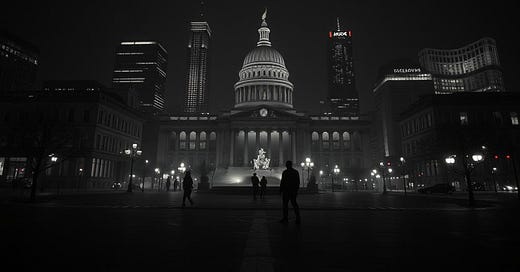In the late 1950s, Peter was just another soldier—a quiet, unassuming man serving in the U.S. Army. That was until the men in white coats came for him. Under the shadowy veil of the MK Ultra program, they injected him with experimental drugs, promising to unlock the full potential of his mind. They spoke of the pineal gland, a mystical key to hidden powers—telepathy, foresight, superhuman perception. For Peter, the experiments were a blur of needles, flickering lights, and voices that weren’t his own. When he left the Army, he buried those years deep, chalking up his lingering quirks—flashes of intuition, a restless mind—to the toll of service. He never spoke of it, not even to his son, Burns, born in 1967.
Burns was no ordinary child. Growing up in a small town in the late ‘60s and ‘70s, he was a feral kid—climbing trees, tinkering with junkyard engines, and sketching blueprints for contraptions no one else could fathom. His mind raced ahead of conversations, finishing stories before they were told, solving problems before they were posed. Teachers called it “distractibility,” slapping labels like ADD and ADHD on him. But Peter, perhaps sensing something deeper, refused the pills the doctors pushed. “He’s just wired different,” Peter would growl, and that was that.
Burns struggled to fit in. His hands, though, were magic—wood bent to his will, engines purred at his touch, and circuits sparked to life under his fingers. He had a sensory awareness that overwhelmed him—every creak of the floorboards, every shift in the wind—but it also sharpened his world. Two loyal friends stuck by him, and together they roamed free, a pack of wild boys in a world before leashes. Burns grew up, joined the Navy, and in 1989, while stationed overseas, his son Casey was born.
Casey was a golden child, but Burns saw the flicker of himself in the boy—the same quick mind, the same sensory edge. Walking at nine months, talking in full sentences by two, Casey breezed through school with straight A’s and a grin that won over everyone. Sports came easy—baseball, track, football—and his classmates adored him. Burns, haunted by his own childhood struggles with awkward silences and misread cues, made it his mission to guide Casey through those moments. “People don’t always say what they mean,” he’d tell Casey, sitting him down after a playground scuffle. “Watch their eyes, their hands—they’ll tell you more than their words.” He taught Casey to pause, to breathe, to turn his racing thoughts into a quiet strength. Where Burns had stumbled through social interactions, Casey learned to glide. That guidance turned potential awkwardness into charm, and Casey thrived—popular, confident, a kid who seemed to have it all. In 2008, he enlisted in the Air Force, serving a decade with distinction. To the world, he was perfect. Burns, though, kept his distance from those memories, the scars of his own youth still tender.
Then came Burns II—“B-Two”—born in 2023 to Casey and his wife. From the moment B-Two opened his eyes, Burns, now retired and caring for his grandson during the week, saw echoes of himself. The boy’s tiny hands grasped tools with uncanny precision. His gaze tracked sounds no one else heard. Burns watched, mesmerized, as B-Two’s abilities mirrored his own—and Casey’s, too, if he let himself remember. A few years earlier, Burns had stumbled across the term “neurodivergent” and dove headfirst into researching autism, ADHD, and the gifts they could bring. He called them “superpowers” now—extreme focus, autodidactic learning, a mind that saw patterns where others saw chaos. He’d spent his life fighting those traits into submission; with B-Two, he vowed to nurture them instead.
Burns and Casey had both applied for Veterans Benefits around the same time, using the same rep. The VA moved fast—too fast, Burns thought—designating them both permanently and totally disabled, medically retired. The paperwork cited “service-connected conditions,” but the details were vague. Burns started digging. Memories of Peter surfaced: the old man’s sudden rages, his uncanny knack for knowing things he shouldn’t, the way he’d mutter about “experiments” when drunk. It clicked—Peter’s quirks weren’t just quirks. They were superpowers, mismanaged and misunderstood, just like Burns’ own.
Burns shared his findings with Casey. Together, they turned to holistic health—nutrition, meditation, exercise—taming their restless minds and sharpening their gifts. Burns’ decisions grew sharper, his focus tighter; Casey’s intuition, once dismissed as luck, became a tool he wielded with purpose. They were thriving, not just surviving.
Then, in early 2025, a letter arrived from the VA. Classified files had been declassified, it said. Peter had been part of MK Ultra—an unwilling lab rat in a quest to craft super soldiers. The drugs, the pineal gland experiments—they’d altered his DNA. The effects had cascaded down the line: Burns, Casey, B-Two. Each generation of males carried the imprint, their neurodivergence a gift from a shadowy past. With proper development, the letter hinted, they could become what MK Ultra had dreamed of—superhumans, not in body, but in mind.
Burns sat with B-Two on the porch, the two-year-old tinkering with a wooden puzzle Burns had carved. The boy’s fingers moved with a grace that belied his age, his eyes darting to a bird in the trees before Burns even heard its call. “You’re special, kid,” Burns murmured, ruffling B-Two’s hair. “We all are.”
He thought of Peter, broken by a program that didn’t understand what it had created. He thought of Casey, a warrior shaped by lessons Burns wished he’d had himself, turning raw potential into action. And he thought of himself, the bridge between them, finally at peace with the mind he’d once cursed. The superpowers weren’t a curse—they were a legacy. Burns smiled. With B-Two by his side, he’d make damn sure the world saw them for what they were.




